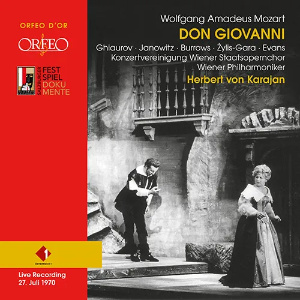
Wolfgang Amadeus Mozart (1756-1791)
Don Giovanni – drama giocoso in due atti (1788)
Don Giovanni – Nicolai Ghiaurov (bass)
Donna Anna – Gundula Janowitz (soprano)
Don Ottavio – Stuart Burrows (tenor)
Donna Elvira – Teresa Żylis-Gara (soprano)
Leporello – Geraint Evans (bass-baritone)
Il Commendatore – Victor von Halem (bass)
Masetto – Rolando Panerai (baritone)
Zerlina – Olivera Miljaković (soprano)
Konzertvereinigung Wiener Staatsopernchor
Wiener Philharmoniker/Herbert von Karajan
rec. live, 27 July 1970, Großes Festspielhaus, Salzburg, Austria. Stereo ADD
Orfeo C230113 [3 CDs: 173]
I included this live performance from the Salzburg Festival in my survey of Don Giovanni, and as three major cast members, including the eponymous anti-hero, were common to both, I compared it with Giulini’s virtually contemporaneous live radio broadcast from Rome, finding “Nicolai Ghiaurov, commanding in the lead role, Gundula Janowitz thrilling as Donna Anna and the lesser-known Olivera Miljaković competent but bland as Zerlina and occasionally out of tune”. Otherwise, I thought the rest of Karajan’s cast generally superior to Giulini’s and commented upon the refinement of the VPO and Karajan’s facility in “generating tension at key dramatic moments”; regarding the Salzburg sound here, I remarked that it was a little dull and distant but easy on the ear.
My response to the singers has not changed so I more or less quote here my original findings verbatim, if slightly adapted: Ghiaurov has a big, smooth, rich bass, properly flexible and seductive if occasionally a little monotonous; he does not employ much wit or humour, but just exudes a massive, testosterone-pumped confidence. Geraint Evans’, bluffer, broader more blustery manner is apt for depicting the aristocratic philanderer’s put-upon side-kick and his coarser way with the comedy isn’t necessarily out of place. Stuart Burrows’ tenor is mellifluous, yet powerful; Teresa Zylis-Gara for is fine, pure and flexible. Victor von Halem is everything he should be: firm, brazen, huge-voiced and chilling. Janowitz is simply divine, dominating the ensembles, agile and soaring in her solos. I love her fluty tone; its virginal, disembodied character is perfect for depicting the prim and proper Donna Anna. As I mentioned above, the only comparatively weak link is Miljaković.
However, my own copy was issued by Orfeo more twenty years ago, so I was intrigued to find out whether any improvements in the sound had been effected for this new re-issue. It might perhaps be marginally crisper – or less woolly, however one wants to term it – in the new issue but in fact I can hear very little difference, if any at all, so I assume there has been no re-mastering and probably none was needed. Reacquaintance with the set gives me a new appreciation for the drama of the proceedings and the excellence of the singing; it is certainly sonically preferable to Karajan’s equally well cast and similarly gripping live Salzburg performance of 1960, which I describe in my survey as being in “radio broadcast mono sound…fuzzy, crumbly and occasionally distorted in parts”.
The booklet is slightly slimmed down compared with the earlier issue and offers only seven rather than eleven black and white photographs but essentially we simply have here the same item. If you are a Don Giovanni devotee and do not have this in your collection, I can recommend its acquisition.
Ralph Moore
If you purchase this recording using a link below, it generates revenue for MWI and helps us maintain free access to the site




















